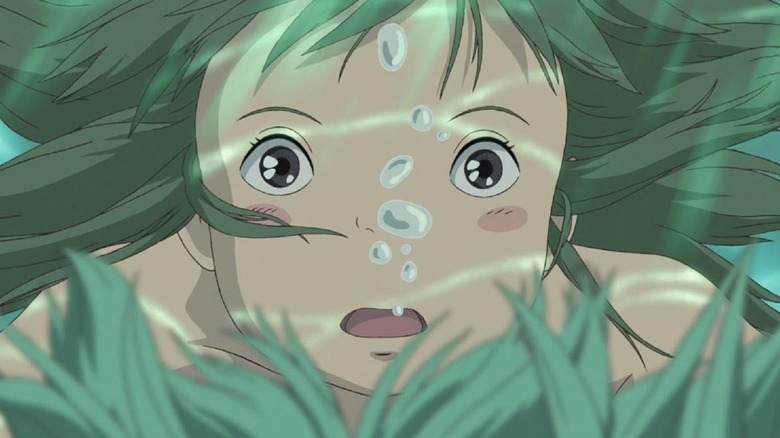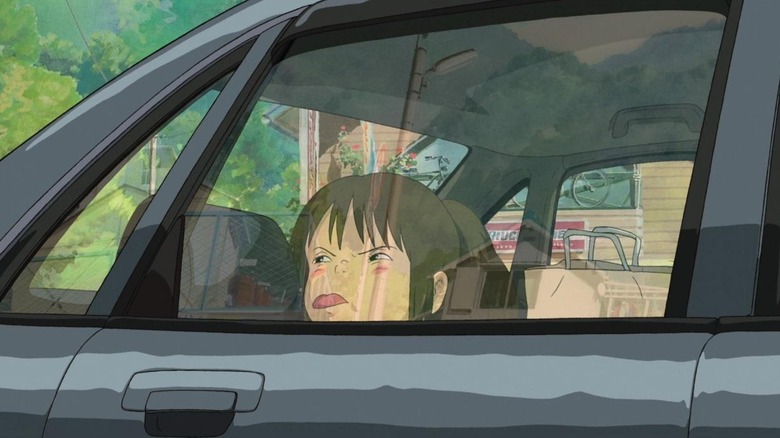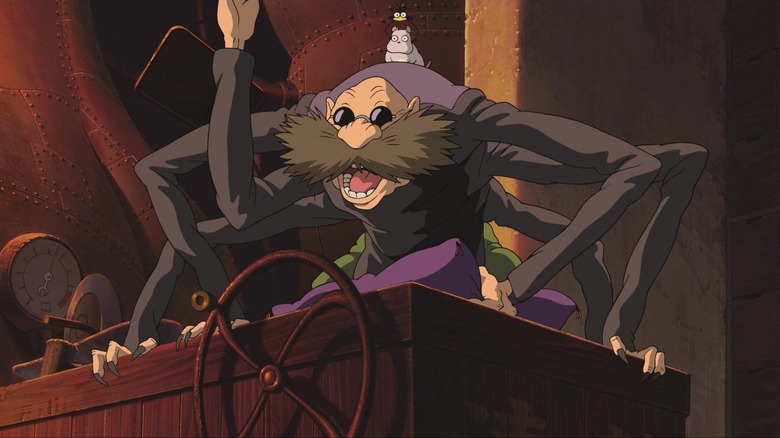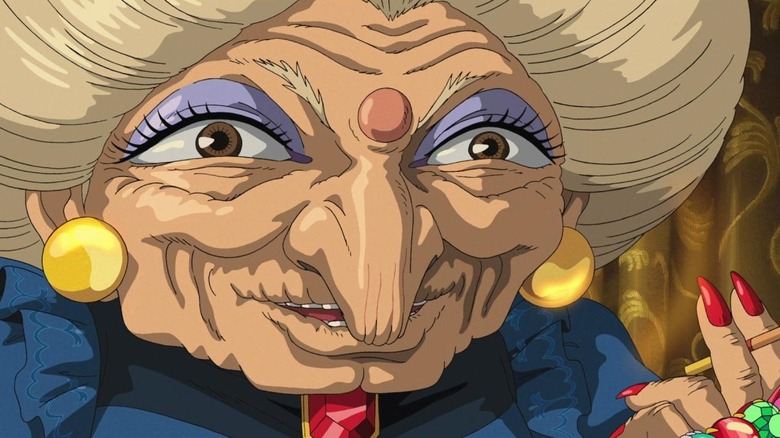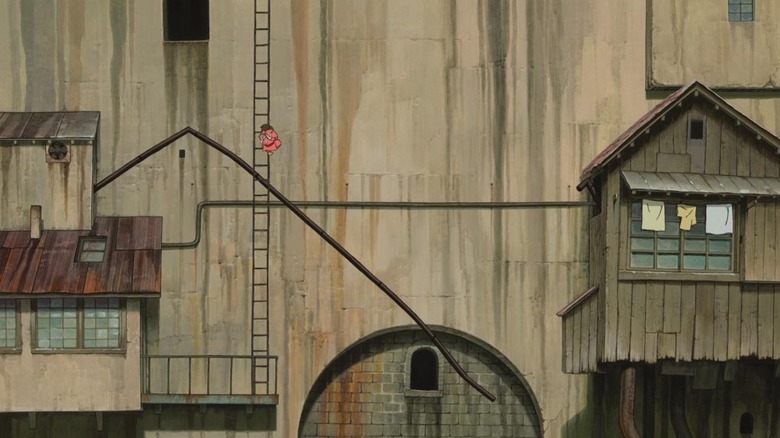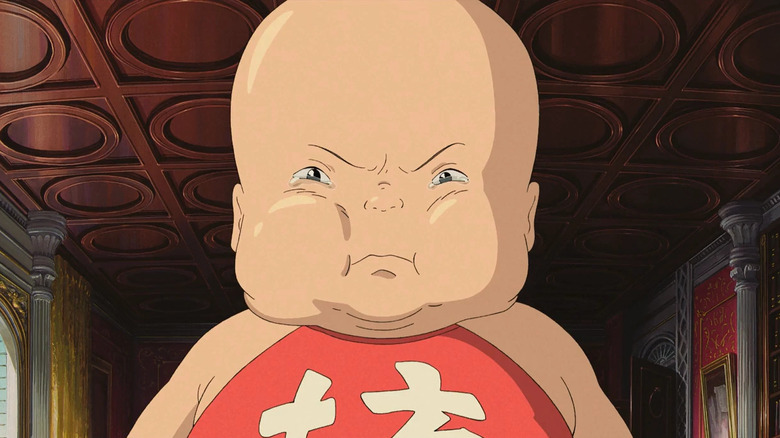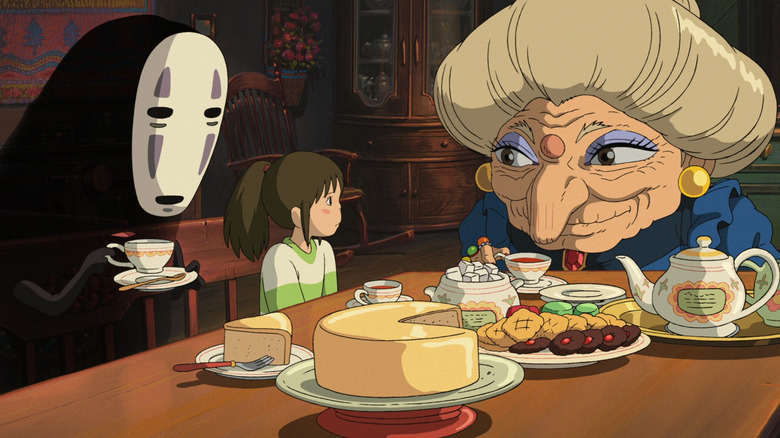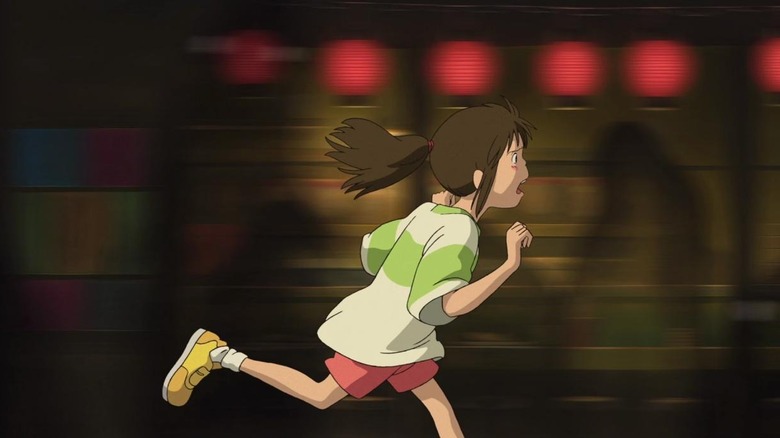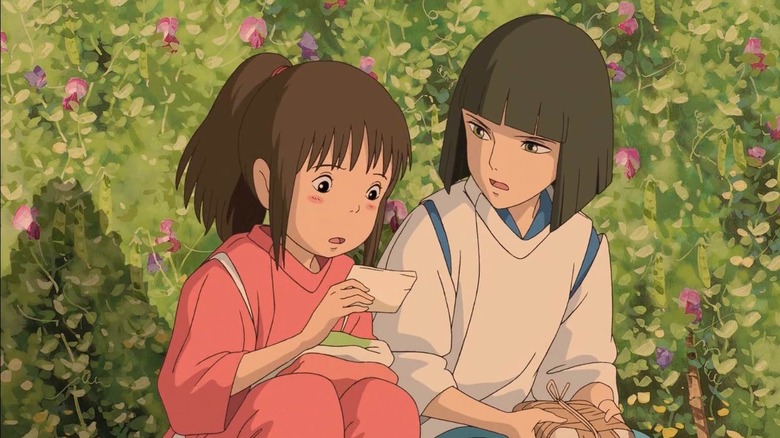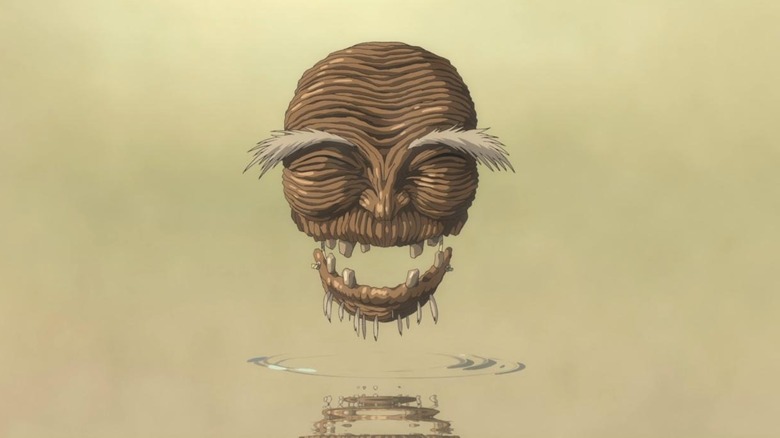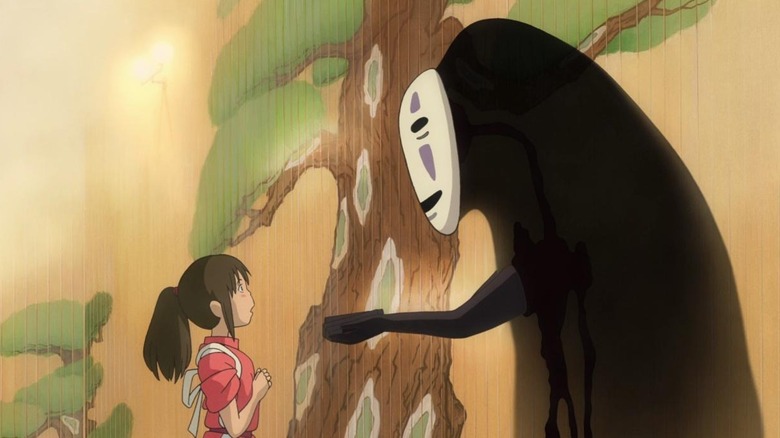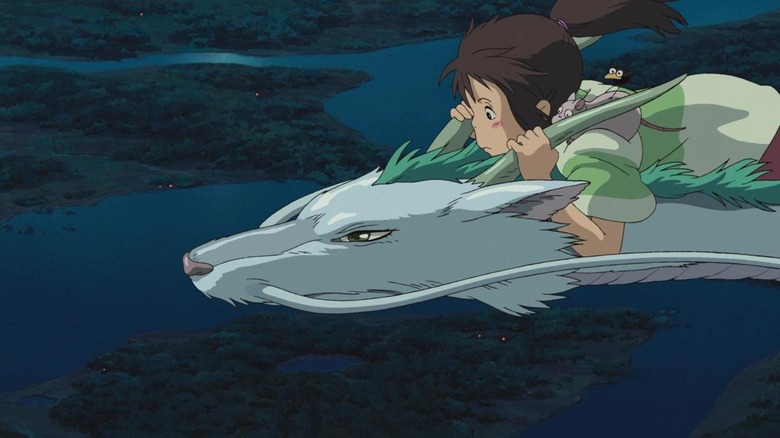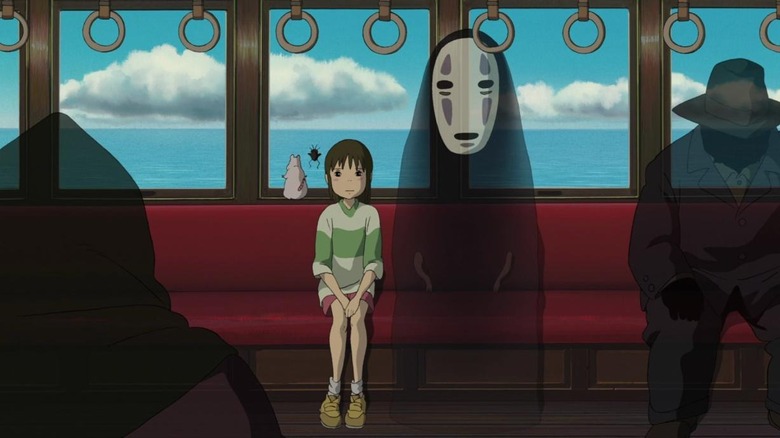Chihiro Ogino's 12 Best Moments In Spirited Away Ranked
For almost four decades, the beloved animation house, Studio Ghibli, has earned a reputation as the producer of some of the most exquisite animated movies of all time. Undoubtedly the most prestigious of these is 2001's "Spirited Away," the movie that brought it widespread acclaim among Western audiences when it won the Academy Award for best animated feature — a category that was still very much in its infancy, only having been introduced the year before.
Weaving a fascinating and fantastical narrative — rich in traditional Japanese folklore and storytelling — with the universal themes of consumerism, coming of age, and identity, "Spirited Away" is anchored by its young female protagonist, Chihiro Ogino (Rumi Hiiragi). Chihiro's life takes a surprising turn when her parents decide to take a shortcut on the way to their new home. Stumbling into a bizarre and bustling spirit world, Chihiro is forced to take a job at the bathhouse run by the formidable witch, Yubaba (Mari Natsuki), to save her parents and earn her freedom.
Chihiro introduces the audience to the spirit realm as we experience all the strangeness and beauty of it through her eyes. As a character, she is not just incredibly likable, but also demonstrates huge amounts of growth and change — meaning it is easy to invest in her journey. While there are a number of great scenes to choose from, these are just some of her best moments in the film as her character developed.
12. The car journey to a new life
We first meet Chihiro as she lounges in the back seat of her parents' car, seemingly disinterested in the journey and where they are going. It is established that the place the family is moving to is considerably quieter than what they are used to, with Chihiro's mother (Yasuko Sawaguchi) remarking that she'll need to start shopping in the next town. The sense of being off the beaten track is further emphasized by the slightly uneven road Chihiro's father (Takashi Naito) takes them down, believing it will be a shortcut.
While Chihiro doesn't say much in this opening scene, we get an immediate grasp of her personality, which proves to be essential later on for her character development. Initially, she comes across as a typical sulky pre-teen, complaining the only flowers she has received were as a farewell present, and poking her tongue out at her new school, declaring, "I liked my old school."
As the journey continues, we see another trait: When she spots the "little houses" by the roadside, she is immediately curious and asks her mother what they are to learn that they are shrines — turning back to look at them as they drive away. Not only does this show Chihiro's inquisitive mind, but it also indicates where the story is heading. "Spirited Away" is heavily influenced by Japanese Shinto-Buddhist folklore, and the idea of "looking back" and memory is something that becomes incredibly important as the film progresses.
11. Entering the boiler room and meeting Kamaji
Reeling from the trauma of seeing her parents turned into pigs, Chihiro finds an instant ally in the spirit world in Haku (Miyu Irino) — a young boy who seems to be well-respected among the spirits at the bathhouse and is keen to help Chihiro escape from it. As Haku distracts the other workers, Chihiro has her opportunity to get away and heads down to the boiler room to meet Kamaji.
In the dark and steamy depths — far away from the color and vibrancy of the bathhouse — Chihiro finds the spider-like Kamaji (Bunta Sugawara). Assisted by soot sprites, Kamaji controls and stokes the boiler that heats the water for visiting spirits to enjoy their baths. Chihiro is unsurprisingly wary when she first enters the room. However, she knows it is her only choice if she is to survive and save her parents.
While still fearful, Chihiro demonstrates her determination to work in this moment, repeatedly asking the old man to give her a job and not giving up easily. Chihiro has already grown a lot compared to the stubborn and lackadaisical girl we first met, and even though Kamaji turns her down and sends her to Yubaba, she shows her willingness to see a job through to the end. Chihiro's resolve — even in the face of great danger — is one of her defining character traits and this scene gives us an early example of this.
10. The first meeting with Yubaba
While Chihiro first encounters Yubaba when she sees her bird — who bears the face of the witch — it is not until after Kamaji refuses her work that she has her first proper audience with the person who holds the key to her destiny.
The distance between the boiler room and Yubaba's penthouse is vast. As Chihiro ascends with Lin (Yumi Tamai) to meet the witch, there is the impending realization of the immense hold Yubaba has, residing high above the lowly workers below with their fates at her mercy. Via a complicated network of elevators, Chihiro eventually arrives at the lavish quarters of Yubaba's penthouse and experiences her power when she is supernaturally summoned toward her.
There is great significance to this first meeting with Yubaba — beyond it being our first glimpse of the film's villain — as it proves to be a seminal moment for Chihiro. As she continues to show unwavering determination, Chihiro manages to convince Yubaba to allow her to stay. However, while her life is spared, it does come at a cost, as the witch takes away her identity as "Chihiro" and gives her the new name, "Sen." Throughout the film, we continue to see Chihiro grapple with who she is, and the link to her true identity is something that this story continues to explore.
9. Taking her bravery to new heights to save Haku
Along with Lin, Chihiro finds a reliable ally in Haku, and he is the first person to offer her some comfort when she finds herself in this new world. While his allegiance to Yubaba means he can't be seen frequently helping Chihiro, Haku steers her to where she needs to be. He shares a particularly beautiful, heartfelt moment with her when he offers her food. Realizing that she has a strong and reliable friend in Haku, Chihiro also becomes fiercely protective of him, which is demonstrated when he is under attack.
As Chihiro looks out at the vast ocean that has surrounded the bathhouse, she notices some paper doll-like creatures attacking a dragon, who she senses is Haku — now in his other form. Recognizing others despite the mask they may wear, or the false identity they carry, is an important theme in "Spirited Away," and the fact that Chihiro can identify the dragon as Haku is notable.
While she lacks supernatural abilities, Chihiro's love for her friend leads to her brave and bold choices to save him. Although the workers in the bathhouse gather to fawn over the gold-giving No-Face, Chihiro turns down the money so she can find Haku. As she escapes from the hordes, Chihiro scales the walls and even runs along a precarious pipe to find him — a far cry away from the girl once too timid to descend the stairs to the boiler room.
8. Teaching Bôh a lesson
Chihiro's journey is a fascinating one — not just in how she explores this strange new world, but also in how she matures. The first time we meet Chihiro with her parents, she laments what they have left behind and shows little excitement about their new life. Moving somewhere unfamiliar is a huge upheaval, but Chihiro's parents believe it will be the best thing for them, so they try to encourage their daughter to be more open to it.
Chihiro's parents might not have had being turned into pigs or having their daughter trapped in a spirit world on their list of new experiences, but Chihiro's encounter proves to be the making of her. It forces her to grow up quickly and encourages her to welcome the idea of change — something she imparts to Yubaba's baby, Bôh (Ryunosuke Kamiki).
As Chihiro desperately tries to find Haku, she stumbles into the playroom of the oversized Bôh. The light of Yubaba's life, Bôh lives a sheltered existence — not just protected from the outside world, but taught to fear it and its "germs." Bôh believes Chihiro has been sent there to make him sick, but also worries she will get ill if she leaves. However, Chihiro tells him, "It's staying in here that'll make you sick." It may seem like a fairly innocuous moment in the film, but it shows how much she has grown: not just embracing change, but encouraging others to do so as well.
7. Teatime with Zeniba
When Chihiro learns Yubaba has a twin sister, it initially appears they are just as alike in personality as they are in looks. As Chihiro hurries to save the wounded Haku, she is unaware that one of the pieces of paper that had been attacking him has attached itself to her clothing. The paper spirit transforms into Yubaba's sister, Zeniba (also voiced by Mari Natsuki). She firmly warns Chihiro not to speak of this incident and demands that the golden seal Haku stole from her be returned.
However, when Chihiro travels to see Zeniba and return her belongings, she discovers how different she is from Yubaba. Her true nature is kind and generous, and in her secluded cottage far away from the bathhouse, Zeniba lives an idyllic life. Chihiro immediately returns the seal and apologizes on behalf of Haku. Afterward, Zeniba invites Chihiro to sit to have tea.
In stark contrast to Yubaba's palatial quarters, Zeniba's cottage is cozy and warm, and this interaction provides Chihiro with some welcome normality. Zeniba immediately bonds with Chihiro. While she states she cannot help with her quest, she offers some cryptic advice by saying, "Nothing that happens is ever forgotten even if you can't remember it." While she may not realize it, these sage words from Zeniba stay with Chihiro, and the token she provides — a protective hair tie — sees Chihiro safely through the rest of her journey.
6. Entering the spirit realm
Even before entering the spirit world, Chihiro appears timid and scared of her own shadow, clinging onto her mother for dear life when they get out of the car to walk through the mysterious tunnel they stumble upon. Little does she know that things are about to get even more frightening, and when her parents' greed transforms them into pigs, she is forced to face this new world on her own.
As night draws in and the lamps are lit, what had previously looked like an abandoned and uninhabited theme park transforms into a bustling town filled with mysterious and shadowy figures. After the warning from Haku and discovering what happened to her parents, Chihiro is now scared and alone, and we begin to absorb the strange and changing landscape along with her.
These early moments as Chihiro first experiences the magic and malice of the spirit world are pivotal for her as a character. She perfectly captures what any 10-year-old would feel in this situation: the mixture of awe, wonder, and fear written clearly on her face. She runs the gamut of emotions but also demonstrates some of what we will see develop later: bravery and trust. As her physical form begins to fade, Haku arrives to help her by offering food from this world. Initially skeptical, Chihiro accepts the food, which is a crucial moment as she begins to form a bond with Haku.
5. Learning the importance of her identity
As well as being a mythical adventure story, "Spirited Away" is a reflective and poignant coming-of-age film, as we see Chihiro go from being clingy and cautious to independent and determined. While she experiences several trials along the way and has to work hard to appease those with the power to keep her trapped in the spirit world, she also learns a lot about herself.
With the help of Haku, Chihiro manages to convince Yubaba to let her stay in the bathhouse and work, but the cost of making this deal with the devil is that she loses her name. Renamed by the witch as "Sen," Chihiro realizes this isn't just a symbolic gesture by Yubaba; remembering her real name will be essential if she wants to save her parents and leave this place.
After her first night in the bathhouse, Haku takes Chihiro to see her parents, who have been turned into pigs. Not only does she struggle to identify them, but she also uses her new name, "Sen," proving that Yubaba's magic is already taking hold. As she breaks down, Haku offers food and comfort and explains the importance of her remembering her name, having forgotten his own a long time ago. The process of recall is essential for her survival, but the idea of knowing who she is and finding self-assurance is an important life lesson that Chihiro must learn.
4. Giving the Stink Spirit a bath
While Chihiro remains focused on escaping from the bathhouse and helping her parents, she quickly settles into a work routine. Busying herself alongside Lin, Chihiro soon encounters some of the unique spirits that arrive at the bathhouse. One of these is the appropriately named Stink Spirit, an oozing mass of sludge that emits a particularly nasty odor.
When Lin and Chihiro are given orders to look after the big tub, they face a huge clean-up operation to make it pristine and ready for the next customer. The spirit trudges through the rain toward the bathhouse, and the workers desperately try to turn him away before retreating due to the awful stench. The smell similarly repulses Chihiro, but regardless, she takes the spirit for his bath under the instruction of Yubaba — who keeps a close watch from a safe distance.
Facing a baptism of fire — or perhaps sludge in this case — Chihiro shows grit and determination to help the spirit, and when she notices a thorn stuck in it, she rallies everyone together to remove it. As it turns out, the Stink Spirit is the River Spirit, which had been so polluted by the garbage thrown in it that it was no longer recognizable. This moment is a crucial one for Chihiro as it earns her Yubaba's respect and demonstrates one of her best qualities: that she can recognize the good in people when others do not.
3. The bathhouse encounter with No-Face
Appearing as an almost ghostly apparition, the spirit known as No-Face is a wandering soul who seems to gravitate toward Chihiro. While it isn't initially clear what his intentions are, No-Face has the ability to absorb things from his surroundings, and he soon begins to mimic the corruption and greed that he sees in the bathhouse. When he starts handing out gold and demanding food, the workers fall over themselves to get tips from the seemingly rich visitor and feed his insatiable appetite.
Away from the hive of activity, Chihiro witnesses Haku being attacked and rushes to save him, encountering No-Face and his legions of adoring fans along the way. As No-Face offers Chihiro gold, she shocks everyone by turning it down, saying, "[I] don't want any, but thank you." This not only gives a clear indication that Chihiro values friendship and those she cares about over material things, but it provides No-Face with an example of truth and goodness — something that appears to be in short supply among the other workers.
Chihiro also proves to be essential in helping No-Face out of the bathhouse later: When No-Face offers her gold once again, Chihiro not only turns it down, but she shows a personal interest in him, causing him to admit for the first time that he is lonely. After giving No-Face the dumpling gifted to her by the River Spirit, all of his evil and hatred come spewing out, leaving him "clean" again.
2. Flying with Haku and unlocking his memories
Identity is hugely important in "Spirited Away," with Chihiro learning about who she is and was after Yubaba gives her a new name. Guiding her on this journey is Haku, who frequently emphasizes that she must remember her identity and reveals that he doesn't know his real name.
From the moment they meet, it appears that the two may have a shared past — something Haku seems to confirm when he cryptically says, "I've known you since you were small." With this in her mind, Chihiro begins to experience flashbacks where she sees her and Haku in his dragon form underwater.
After Chihiro meets with Zeniba and reconciles on Haku's behalf, he arrives to safely take Chihiro back to where she came from. In a beautifully cathartic moment, Zeniba acknowledges her forgiveness to Haku — perhaps something that also helps him on his journey to rediscovering who he is. As they are flying away, Chihiro recalls an incident — the same one she experienced flashbacks of — when she was a young girl, and she fell into a river. When she tells Haku it was the Kohaku River she fell into and that Kohaku is his real name, he can suddenly remember who he is: a river spirit who saved Chihiro's life. Throughout the film, Chihiro had been adamant that Haku was a good person, and her unwavering loyalty and determination to be true to who she is earned his freedom as well as her own.
1. The train journey with No Face
Perhaps one of the most enduring images from "Spirited Away" is Chihiro sitting silently on a train with No-Face by her side. As well as being exquisitely animated, this quiet and contemplative moment offers a rare moment of tranquility away from the bathhouse's madness and allows Chihiro to reflect on what has happened so far and the changes she has experienced.
It is fitting that this scene comes almost immediately after No-Face's chaotic encounter with Chihiro at the bathhouse — not just because the contemplativeness of it is a welcome palette cleanser, but because there is a common link between Chihiro and the mysterious spirit. No-Face is perhaps representative of Chihiro in some ways, lonely and wandering through life without a clear purpose, and he similarly undergoes quite a transformation. After beginning with little character and being consumed by the corruption and greed from the bathhouse — almost to the point of destruction — No-Face is finally transformed by Chihiro's kindness.
Despite the mayhem caused by No-Face, Chihiro allows him to travel with her, offering one of her train tickets so he can board. This beautiful moment demonstrates how so much can be said without saying anything at all, and as Chihiro stares wistfully out the window, we can't help but wonder what she is thinking. The Chihiro that we see at this point is completely different from the one we first met, and this moment gives both her and us the space to consider that.
